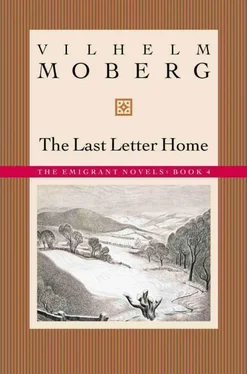His gun was still hanging on its peg in the cabin; he was not out hunting. But some accident could have happened to him in the wilderness, some stray Indian might have murdered him, or he might have done himself some harm. Perhaps he had left because he couldn’t endure living alone after his mother’s death. But in that case, since he was a good old hunter, he ought to have taken his gun with him.
Jonas Petter wanted Karl Oskar to join him in a posse to look for their missing countryman. Danjel Andreasson and his son Sven would also come, and a few American settlers, old hunting friends of Månsson who wished to participate.
All told there were about a dozen men in the posse to look for the missing man. They searched the forest near his claim but found no sign of him. The posse stayed in the wilderness several days without discovering any clues to explain his disappearance. The men dragged the little pond near his cabin but caught only the half-rotten carcass of a drowned elk calf and an old canoe of the kind the Indians used.
Finally the posse gave up. They knew as little when they stopped as when they had begun. What had happened to Anders Månsson? Was he alive or dead?
The mystery was solved some time later.
A boy from Franconia was fishing at the rapids below Taylors Falls when he noticed a hat that had stuck between two stones in the St. Croix River. The boy fished up the hat with his hook. It looked as if it had been long in the water. And in the hat was a clue to its owner: two big letters printed on the sweatband in red ink, now somewhat blurred but still quite legible: A. M. And there was no doubt to whose head this hat had belonged, since Mr. Fischer in Taylors Falls recognized it as belonging to Anders Månsson. He had once forgotten it at the inn.
All thought that Fina-Kajsa’s son had himself jumped into the stream. He could possibly have fallen in while fishing, but he never fished in the St. Croix River, and he could have had no other errand to the rapids.
His body was never found. Undoubtedly it had floated a long way from the place where his hat was stuck between the stones. During the fall rains the strong current might carry a corpse with it to the still greater stream, the Mississippi, which then would take charge and carry it to the big sea.
Anders Månsson had been the first Swedish settler in the St. Croix Valley, but no grave opened for him under the silver maples in the settlers’ cemetery. He himself undertook the one emigration that remained for him.
One single decision had decided his life, the great decision to emigrate, the irrevocable, the irreversible. To him had been put a strong command which he was unable to follow, the first commandment in the emigrants catechism: Thou shalt not regret Thy emigration!
IV. THE SETTLERS’ HOLY DAYS
— 1—
That autumn Karl Oskar cleared and plowed the last of the meadow that had originally stretched from the forest down to the lake. Thus he had turned into a tilled field the entire slope which had at first attracted him and made him select this lakeside for his farm. He had now broken more than thirty acres and no more meadow ground for tilling was available on his claim. And Kristina thought they now had enough without further clearing.
But Karl Oskar liked to sit at the gable window and look out at the oak stand on the out-jutting tongue of land to the east of the house; those mighty, high-breasted oaks with their enormous crowns grew in topsoil at least three feet deep, a ground that was as fertile as his fields. The grove back there called for a tiller as it were; it would add fifteen acres to his field!
Up to now the tiller of these shores by the Indian lake had only needed to put the plow into the ground and turn the turf. It was easy enough to break new fields on even meadowland, it was something else to tackle a heavy oak forest. But those great trees — a mixture of white oak and red oak — kept challenging him: Try to make a field here if you can! Our roots are thick and strong and go deep into the ground — try to pull us from our hold! Here your strength won’t suffice! Come and try!
This oak grove had trees that were four to six feet in diameter. The felling alone would be an immense labor. And afterward the greatest hindrance would remain: the stumps. How could he get rid of them? He pondered this problem at great length. Oak stumps in America were as much of an obstacle to a tiller as stones in Sweden.
How could Karl Oskar conquer these mighty oaks, so securely rooted in the deep soil? Well, his sons were growing up, and becoming stronger; he must wait with this new ground breaking until they could help him. As soon as Johan and Harald could do a full-grown man’s work, they would tackle the oak grove; then the strength of the tiller would be measured against the oaks.
He was also planning for his new buildings. But with the Civil War came dear times. Prices on implements made of iron and steel rose quickly. Everything he needed to buy for his house building grew more expensive. He must wait awhile. He had hauled thick oak logs to the steam mill in Center City, where they had been sawed into planks and boards for the new house; he had a tall pile of timber already. And this year he planned to cut sills and foundation logs.
But the war delayed all activity, all building in this part of the country. There must be an end to destruction and ruination before new undertakings could be started; one could not build a new house while the old was still burning.
— 2—
A mile and a half from their farm stood their church, a modest building of rough timbers, deep in the forest. But the church pointed a little wooden spire toward Heaven, indicating it was a God’s house, a Lord’s temple. The Swedish immigrants had sacrificed many days of labor on their church, they had gone in debt for it and had not yet been able fully to pay for it.
Karl Oskar and Kristina went to the timber church every Sunday unless blizzards or other bad weather prevented them. Once in a great while they would stay at home out of pure tiredness and celebrate their day of rest in the home. But the distance between the church and their home was not so great that they could not hear the ringing of the bell which had been hung last year. The bell had cost all of ninety dollars and was paid for by the “nuisance tax”—fines levied against parish members who in one way or another had misbehaved during the service. Petrus Olausson himself, the church warden, had suggested this tax, and he was greatly lauded for it when at last it bought the church a bell. To the poor parish, barely able to support a pastor, ninety dollars was a great sum. First and always, it was cash that the settlers lacked.
Kristina could again hear the ringing of a church bell. On days when a favorable wind carried the sound it seemed quite close to her. But to Kristina’s ears the new bell did not have the thunderous, sacred tones of a real church bell. As a child home in Ljuder, when she heard the bells she would shudder deep in her heart: The sound came from the heavens, like the thunder of the doomsday trumpet. The ringing from on high called to communion or service. But the settlers’ bell here in America had an entirely different tone. It almost sounded like a dinner bell on a farm, calling to an ordinary meal; it was better suited to a weekday than a Sunday. The bell did have a light, quite beautiful tone, but it jingled rather than rang. The sound was pleasing to Kristina’s ears but found no response in her soul.
To her the church bells of Ljuder signified weddings and funerals, peoples union in life and their departure from it, the move into a new home and the move to eternity. On Sundays the bells from the parish church hurled a mighty command to the inhabitants: It was the Sabbath, they must go to church to confess and shed the burden of sins accumulated through the working week, cleanse body and soul. At the first sound of the bell on Sunday morning her father used to say: Now I hear it is Sunday! I feel it is a holy day! Time to wash and change shirts! Those bells instilled piety in the minds of the listeners.
Читать дальше












